Property values in Auckland’s “shoebox” suburbs have slumped and stand to lose the most from a market slowdown, new OneRoof figures suggest.
The latest house price data from the OneRoof-Valocity’s House Value Index shows the average property value in Auckland’s inner-city suburbs – where one-bedroom and studio apartments dominate – has grown less than 10% in the last 12 months, completely out of step with the 25% surge seen elsewhere in the city.
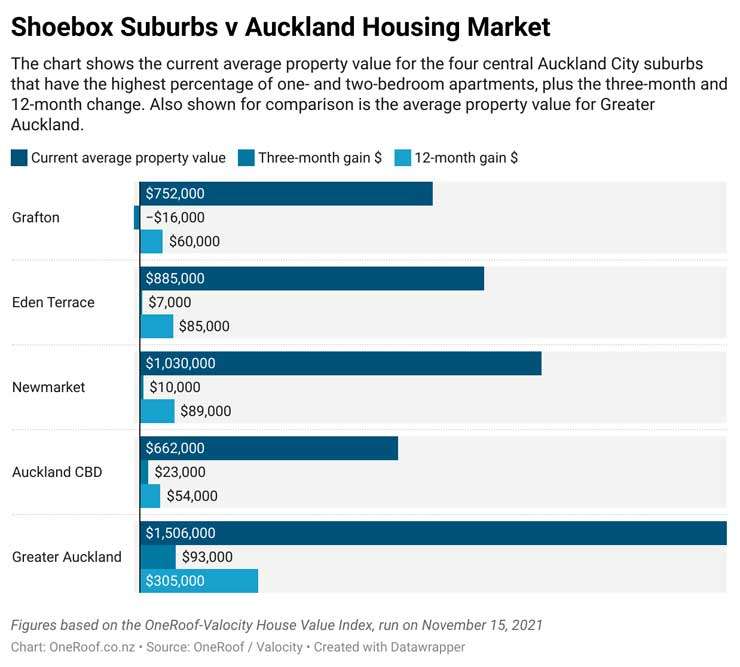
The data shows the lockdown has also hit the suburbs hard. The average property value in Auckland CBD, the city’s most affordable suburb, rose just 3.6% to $662,000 over the last three months – 3 percentage points lower than the 6.6% growth seen in Auckland overall.
Start your property search
House price growth in neighbouring Eden Terrace and Newmarket over the same period was 0.8% and 1% respectively, but Grafton’s market collapsed, with lockdown wiping $16,000 off the suburb’s average property value.
Long home to university students and renters, Grafton is the only suburb in Auckland City where the average property value has dropped since the end of August.
However, the slowdown in the inner-city property market is an opportunity for first-home buyers to get a foot on the property ladder, say two of the area’s leading real estate agents.
Daniel Horrobin, director of City Realty Group, and Steve Kirk, one of his top agents, say banks are now much more amenable to lending on shoebox apartments, so first-home buyers should be open to them.
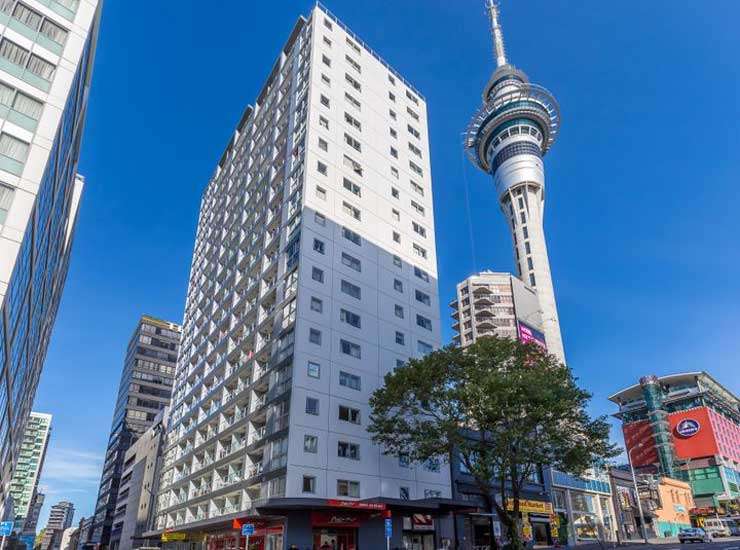
The Altitude Building in Auckland CBD. Apartments there can sell for as low as $353,000. Photo / Supplied
They both stress now is the time to buy for a variety of reasons – one is the debt-to-income restrictions being implemented by the major banks. First-home buyers who previously may have had a pre-approval of $800,000 are now finding the amount they can borrow greatly reduced.
“One case we know has had that smashed to $550,000. All their income is exactly the same, it’s just their income has been measured differently due to the new criteria,” Kirk says.
“I think that, included with the housing market prices, means we are going to have a really busy year for owner-occupiers coming into the city and other central suburbs with the unit titles.”
Kirk says apartments over 38sqm now qualify as a standard apartment with the ANZ, and apartments of 40sqm or more qualify with most other banks.
You can pick up such an apartment for $400,000 and that’s a great option for a first-home buyer who can begin to reduce the mortgage and build up some equity with a view to buying a house later on, he says.
An example is the $353,000 apartment in the Altitude Building on Kingston Street in the city which is under contract to a first-home buyer who will get two bedrooms and the city on the doorstep. “It really does work with first-home buyers or couples who could have a ten-year plan to buy a house,” Kirk says.
And some larger city apartments are plenty big enough, Kirk and Horrobin say, like 417/149 Nelson Street, a 56sqm fully renovated two-bedroom unit with a balcony and a car park which sold in November for $555,000 to another first-home buyer.
People should get in now before the market “steamrolls” ahead next year, they say, and the City Rail Link is coming and public transport is improving so the city is becoming a more desirable place to live in.
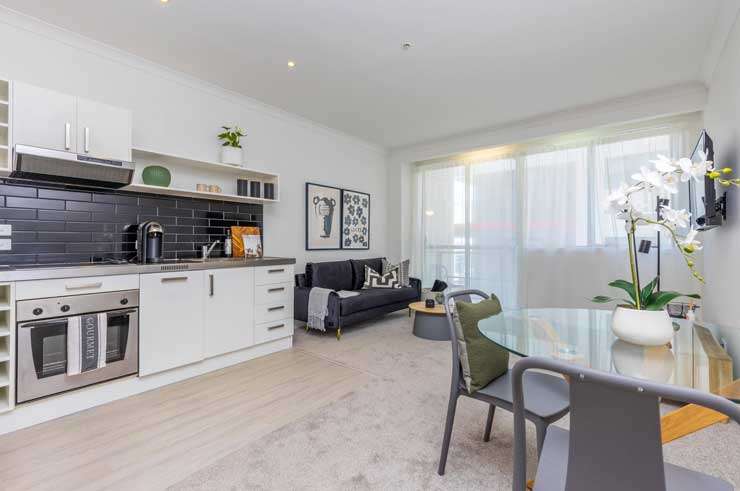
This two-bedroom unit recently sold for $550,000. Photo / Supplied
“But one of the big triggers has been the ability for first-home buyers to go and get really, really good funding packages on apartments which over the last decade has been a challenge.”
Horrobin says investors, who have been hit by the loss of the international student market, should also keep in mind the “massive” opportunity there is now, which is only for a limited time. “Once those borders open that’s going to immediately put pressure on available units, which is going to put upwards pressure on rents, which will offer better returns for investors.”
Suzie Wigglesworth, general manager of Auckland central residential for Bayleys, however, says first-home buyers prefer the suburbs, though that may change.
She says apartment sales have stalled not only at the budget end but also for more expensive apartments – people just don’t want to live in the dead CBD right now, she says.
Wigglesworth says a few years ago a push to attract first-home buyers into the shoebox apartment market didn’t work because they just didn’t want to be there.
“We’ve (currently) got apartment buildings where we've got product below the KiwiBuild threshold and we still can't move them, and that’s in the central CBD.
“Covid has really ruined that market altogether at the moment and until we can open our borders and attract international students back and foreigners visiting Auckland itself, I think it's going to be a long time before we see anything much happening in that arena.”
Top end product is struggling, too.
“We've got a listing at The International (for $2.85 million) which one of my team has been promoting and the inquiry levels are quite low.”
A number of apartments are available at The International, she says. “They are completed apartments, amazing views, fantastic facilities, good quality and nobody is interested.”
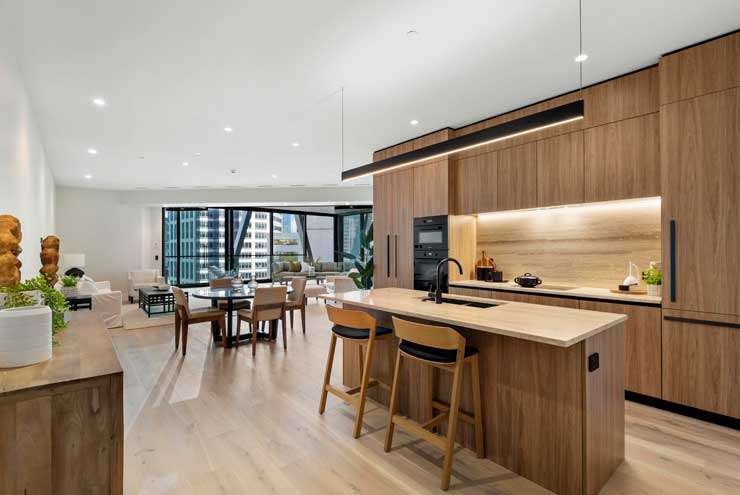
On the market for $2.85m, and looking for a buyer, is this apartment in The International. Photo / Supplied
Some apartment sales are being made, with $250,000 leasehold properties transacting better in October through November but they are being bought by traders who sell one and buy another.
Wigglesworth thinks first-home buyers have yet to really understand it’s better to buy sooner rather than later regardless of what the property typology is.
They are hanging onto the Kiwi dream and even though they know they won’t get a quarter acre section, 10 townhouses in the Parkwood Estate on Westgate Drive in Massey sold for under $1m the first day the development was launched. “That’s what the first-home buyers are buying,” she says.
Wigglesworth expects the government’s focus on high density building around key transport hubs will bring more interest.
“I think you are going to see a lot of activity in places like Panmure, for example, where the train station is.”
Bayleys has a big apartment development coming up early next year in Northcote as part of the regeneration of the North Shore suburb and while Wigglesworth couldn’t say much about the development, she did say the focus is around community spaces with a lot of thinking going into things like rooftop barbecue areas and places where young people might like to hang out.
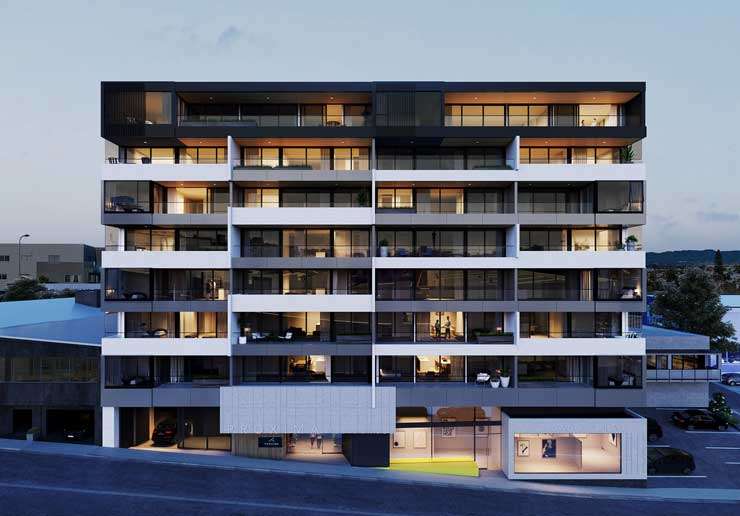
An artist impression of Proxima Residences in Eden Terrace. Photo / Supplied
Suburbs like Eden Terrace, which she describes as a forgotten suburb, could yet turn around, too, she says.
“We’ve got one that is an old development, that’s been on the market for quite a long time, that we are about to relaunch into the market called Proxima Residences, which is in Eden Terrace.”
The apartments are good value for money, she says, with pricing not having moved much and falling into two price bands of $800,000 to $1.5m, and $1.5m and above.
“It’s quite an urban area, a mixture of commercial and industrial, it’s right on that cusp of everything and it sits high on the motorway overlooking the ridge line but has also got amazing views looking out to Sky City and beyond. People have actually forgotten that Eden Terrace can offer a whole lot more than what perhaps some of these other suburbs have got.”
















































































